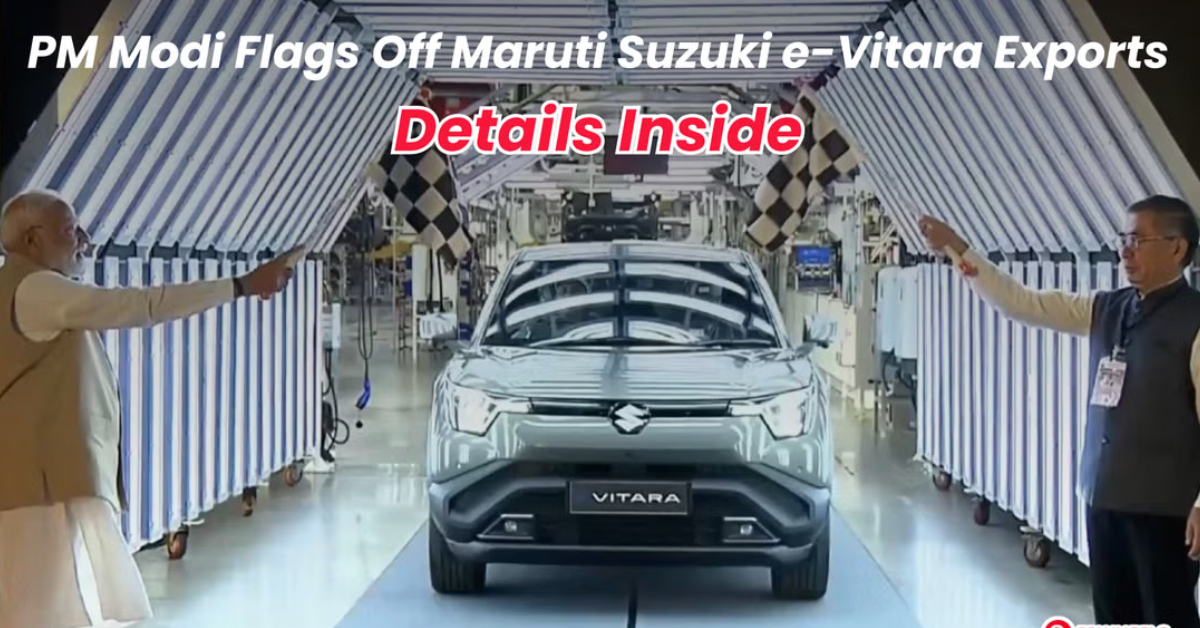India’s electric vehicle (EV) revolution is gaining momentum, and Maruti Suzuki has taken a massive step forward with the export of its first-ever electric SUV, the Maruti Suzuki e-Vitara. The grand event was flagged off by Prime Minister Narendra Modi, symbolizing not just the beginning of a new chapter for Maruti Suzuki but also India’s entry into the global EV market with stronger determination.
The e-Vitara is expected to be one of Maruti Suzuki’s most crucial products in the coming years, designed to compete with global EV offerings while staying affordable and efficient for Indian and international customers alike. But the highlight of this event goes beyond the launch—it reflects India’s ambition to be a global hub for EV manufacturing and exports.
In this blog, we’ll dive deep into what the flag-off means for India’s EV future, Maruti Suzuki’s export strategy, the global market opportunities, and how the e-Vitara will shape the Indian automotive landscape.
PM Modi’s Vision: India as a Global EV Hub
When Prime Minister Modi flagged off the export of the Maruti Suzuki e-Vitara, it wasn’t just a ceremonial event. It was a symbolic move aligning with India’s larger ‘Make in India’ and ‘Atmanirbhar Bharat’ (self-reliant India) vision.
The PM emphasized the need for India to become a global supplier of electric vehicles and not just a consumer market. By entering the export market, Maruti Suzuki is setting the tone for how Indian automakers can take the lead in sustainable mobility solutions.
With government support in the form of FAME-II subsidies, PLI schemes, and EV infrastructure development, India is gradually positioning itself as a competitive EV manufacturing hub.
Maruti Suzuki e-Vitara: A Game Changer
The Maruti Suzuki e-Vitara is not just another EV—it is the company’s first major step into the electric SUV segment, a category that has seen exponential demand globally.
Key Highlights of the e-Vitara:
- Battery & Range: Expected to offer a range of 450–500 km on a single charge, catering to both urban and long-distance drivers.
- Performance: Equipped with fast-charging technology, the SUV can charge from 20% to 80% in under an hour.
- Design: Built on Suzuki’s Global-C platform, the e-Vitara combines stylish looks with a robust SUV stance.
- Technology: Features advanced infotainment, digital displays, connected car technology, and ADAS (Advanced Driver Assistance Systems).
- Affordability: Maruti Suzuki is expected to maintain its reputation for competitive pricing, making EV ownership accessible to a larger audience.
This combination makes the e-Vitara highly appealing not just for Indian buyers but also for international markets, especially in Europe and Southeast Asia, where compact electric SUVs are in demand.
Export Strategy: First Step Towards Global Recognition
Maruti Suzuki has chosen to export the e-Vitara first, which may come as a surprise to many. However, the strategy makes sense for several reasons:
- Global EV Demand: Countries in Europe and Asia have stricter emission norms and higher EV adoption rates. This makes them ideal markets for the e-Vitara.
- Brand Image: By positioning the e-Vitara internationally first, Maruti Suzuki enhances its image as a global EV manufacturer.
- Testing & Feedback: International markets provide valuable feedback, which can help Maruti Suzuki fine-tune the vehicle before a large-scale Indian launch.
- Government Push: The Indian government is keen on promoting exports as part of the “Make in India” initiative, and Maruti Suzuki is aligning with this vision.
Impact on the Indian EV Market
While exports are the immediate focus, Maruti Suzuki has reassured Indian customers that the domestic launch of the e-Vitara is coming soon. Once launched in India, the SUV could be a turning point in the EV adoption curve, considering Maruti Suzuki’s strong presence in urban and rural areas alike.
How it will benefit the Indian market:
- Boost in EV Adoption: Affordable pricing and wide service network will encourage more buyers to switch to EVs.
- Charging Infrastructure Development: To support the e-Vitara, Maruti Suzuki is likely to collaborate with charging solution providers to expand fast-charging networks.
- Competition: With rivals like Tata Nexon EV, Mahindra XUV400, Hyundai Kona Electric, and MG ZS EV, the entry of e-Vitara will intensify competition, benefiting consumers with better choices and prices.
- Job Creation: Increased EV production and export will create new jobs in manufacturing, R&D, and allied industries.
The Road Ahead: Maruti Suzuki’s EV Roadmap
The e-Vitara is just the beginning. Maruti Suzuki has announced that it plans to introduce at least 5 new electric models by 2030, catering to different segments including hatchbacks, sedans, and SUVs.
Some key future plans include:
- Development of solid-state batteries for higher efficiency.
- Establishing joint ventures with global battery suppliers.
- Expansion of manufacturing plants to increase EV output.
- Partnerships with tech firms for connected and autonomous EV features.
By 2030, Maruti Suzuki aims to make EVs a core part of its portfolio, ensuring India not only meets its sustainability goals but also emerges as a leader in global EV exports.
Challenges on the Path Ahead
Despite the optimism, the journey won’t be without challenges:
- Charging Infrastructure: India still lacks a robust and widespread charging network.
- High Battery Costs: EVs remain expensive due to costly batteries, though prices are expected to fall.
- Consumer Awareness: Many potential buyers are still hesitant about EVs due to range anxiety and resale concerns.
- Global Competition: The EV export market is highly competitive with established players like Tesla, BYD, Hyundai, and Volkswagen.
However, with government support and Maruti Suzuki’s massive brand presence, these challenges can be gradually overcome.
Conclusion
The flag-off of the Maruti Suzuki e-Vitara exports by PM Modi is more than just a company milestone—it is a reflection of India’s growing importance in the global EV market. With a clear roadmap, strong government support, and Maruti Suzuki’s trusted reputation, the e-Vitara is set to redefine India’s role in sustainable mobility.
As exports begin, the world will closely watch how India’s largest automaker navigates the competitive EV landscape. For Indian customers, the anticipation is even greater, as they await the domestic launch of a car that could transform EV ownership in the country.



